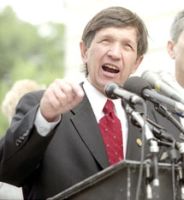|
Public Policy
|
|
Update on the Department of Peace
from Dennis Kucinich Printable Version: Download
as PDF
"We are in a new millennium, and the time has come to review age-old challenges with new thinking wherein we can conceive of peace as not simply being the absence of violence, but the active presence of the capacity for a higher evolution of the human awareness, of respect, trust, and integrity; wherein we all may tap the infinite capabilities of humanity to transform consciousness and conditions which impel or compel violence at a personal, group, or national level toward developing a new understanding of, and a commitment to, compassion and love, in order to create a 'shining city on a hill', the light of which is the light of nations." -- Excerpt from the DoP legislation
The proposal for the Department of Peace (DoP) was recently reintroduced into the House of Representatives by Dennis Kucinich, D-Ohio, making it an active debate supported by 60 representatives and many people across the nation. I was lucky enough to speak with Kucinich on the phone about the current efforts for the DoP. Although the movement faces skeptics, its focus on the Iraq War emphasizes that immediate action is necessary. President Bush's days in office are numbered, and the opportunity to promote the movement and delegitimize violence altogether is gaining strength among Americans from many different political perspectives. When I asked Kucinich what he says when faced with resistance and criticism, he answered, "War is impractical." As the truth of Kucinich's claim becomes clear in the trails of the seemingly endless Iraq war, our society is accepting the idea that war is an inefficient use of resources and a waste of human life. "You can't change the minds of people in another nation by killing them," he continued. "The only way you can truly bring about change is through human relationships." He went on to explain that the dominating cognitive authority has given the science of war some legitimacy, but what about the science of diplomacy or human relationships? The DoP aims to understand and utilize these two ideas clearly, scientifically and effectively. He continued, "The DoP reflects a desire to create a culture of peace and have our government confirm that, with a powerful intention to take a new direction in our relationship with other nations and with our own people here domestically." It has passion, reason and support, but it faces an almost insurmountable task in teaching people that war and violence are ineffective, costly and damaging to society. The DoP has been a long time in the making. Even the framers of the constitution debated the idea; George Washington himself had declared, "a large Army in time of Peace hath ever been considered dangerous to the liberties of a Country." Although we have always had the resources to make the DoP a reality, the American people must first understand the myths of war and violence, and how they are a reproduced and self-perpetuating legacy in our society. With enough public support, this bill could overcome both domestic and international violence. In addition to being an issue decided by Congress, it is about the society we envision for ourselves. Kucinich stressed that the public's support is crucial, and he emphasized, "Student involvement is essential." "Young people," he insisted, "as the exemplars of the future, understand how critical it is that we take a new direction."
Carrie Brode is senior at UC Berkeley graduating with a degree in Peace and Conflict Studies. She enjoys playing backgammon, even when she loses. |
|
|
Resources: The Campaign
to Establish a Department of Peace |

